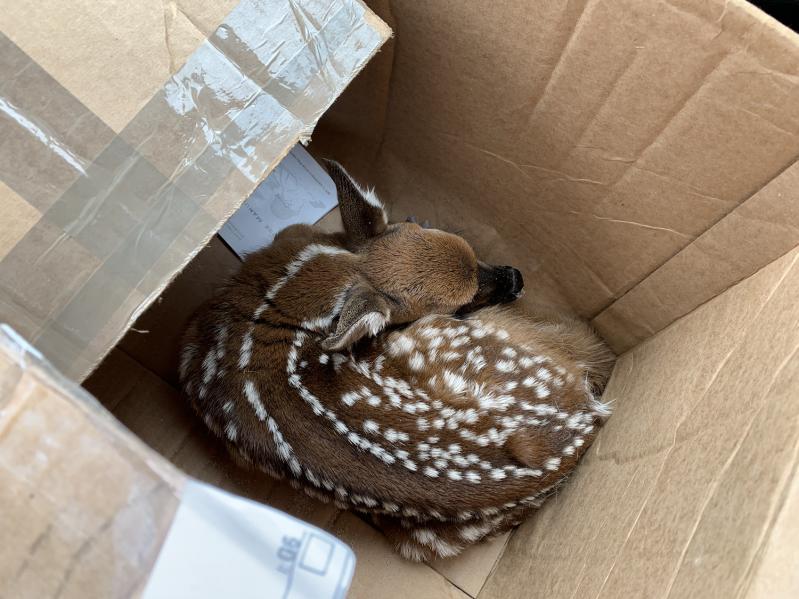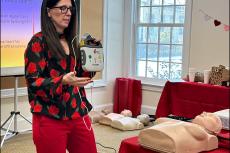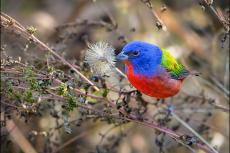A baby bird squeaking on the ground, a turtle inching across the road with cars whizzing by, a fawn seemingly lost in the grass. Scenes like these prompt calls to wildlife rescuers across the East End from people wondering what, if anything, to do.
To better understand how to help, it’s important to look at the most common wildlife rescues that take place here.
According to both Ann Marie Chapman, visitor services manager for the Long Island National Wildlife Refuge Complex, and Zara Beard, founder of EchoWild, a nonprofit dedicated to wildlife rescue, habitat restoration, and conservation education, the most common rescue situations during the summer are baby animals such as squirrels, rabbits, young birds that have fallen from nests, and turtles crossing roads.
Turtles are most active during May and June, when the males look for mates and the females look for suitable habitats and nesting sites to lay eggs, according to Frank Quevedo, an environmental scientist who is the executive director of the South Fork Natural History Museum in Bridgehampton.
“A lot of times these turtles need help because their populations are declining, because of habitat development,” he said.
Mr. Quevedo said if a turtle is moving fairly well as it walks on the road, people shouldn’t interfere by picking it up and moving it. But if a driver sees a turtle that’s obviously in distress or an oncoming car poses a threat, he advises people to put on their vehicle’s hazard lights, make sure it is safe to exit the vehicle, and then pick up the turtle by the edges of its shell and move it in the direction it was already heading. If it is put back where it started, it may turn around and try to cross the road again, Mr. Quevedo said. People who come across injured turtles can call SoFo at 631-537-9735 or Turtle Rescue of the Hamptons at 631-779-3737.
While the spring and early summer may be the most dangerous time for turtles, in the water, animals can become entangled in fishing gear year round, Ms. Beard pointed out. Discarded hooks, lines, and nets can harm and kill birds, turtles, and marine mammals, and animals can also be trapped in trash, like plastic bags, plastic rings from soda cans, balloon ribbons, even little bits of string.
Ms. Beard stressed the importance to residents and visitors of safely disposing of used fishing gear and any trash they take with them or find at the beach or on the water.
While reducing pollution is crucial, rescuers say knowing how to respond when encountering wildlife is just as important. The most important thing to do, they say, is to pause before acting, rather than rushing in to help. Sometimes what looks like an abandoned animal is just a baby deer waiting for its mother or a fledgling bird that’s just left the nest. “So, if you’re not sure, take a picture from a distance and call a licensed wildlife rehabilitator before you touch or move any animals,” Ms. Beard said.
“A lot of people call up with animals that they find in their yard, that they think are abandoned, or maybe got attacked by a cat or a dog,” Ms. Chapman said. “Most of the time, when we get those calls, the animal is okay and hasn’t been injured. We tell the people to leave it alone and let the parent continue to care for it.”
One of the downsides of taking in any sort of baby animal, Ms. Chapman continued, is that not only would that person have to spend the time to properly raise the animal, but they also “risk the animal getting attached to the people that are raising it and not really learning how to be whatever that species is.”
Still, there are moments when intervention is necessary. Experts say if an animal is obviously hurt, bleeding, can’t stand up or fly, or is tangled in something, call Wildlife Rescue of East Hampton immediately; the phone number is 844-728-9453.
Ms. Beard said, “If you’re told it’s safe to do so, you can gently place the animal in a box with air holes in a towel and keep it in a quiet, dark place until a rescuer arrives. Never give food or water unless a rehabilitator tells you to, because it can sometimes do more harm than good.”
A focus on prevention rather than on intervention is something Ms. Beard has also emphasized through her work with EchoWild. Learning how to prevent rescues changed the trajectory of her work, she said.
“When I first started out, the goal was to build our own wildlife hospital, and during the time working inside different hospitals, I kept seeing the same kinds of injuries and illnesses repeated that could have been prevented in the first place,” she said. “For example, many waterfowl come in with lead poisoning, but after they recover, they are released into the same waters that make them sick. And it’s heartbreaking to know that you might see that animal again.”
Beyond knowing how to respond, rescuers say there are proactive measures the public can take to reduce the need for wildlife rescues. Ms. Chapman advised that people keep an eye on their cats and dogs. “Keeping your cats indoors would definitely be number one, because people’s pets tend to attack and injure wildlife and then it becomes an issue,” she said.
Ms. Beard said people can help reduce the number of wildlife rescues by educating themselves. “It really is just about understanding that we share our world and we share our environment,” she said, “and it’s our responsibility to take care of the beautiful place where we live. . . . It’s about being mindful and just aware.”
—
Paloma Demers was a participant in the 2025 East Hampton Star Summer Academy.




